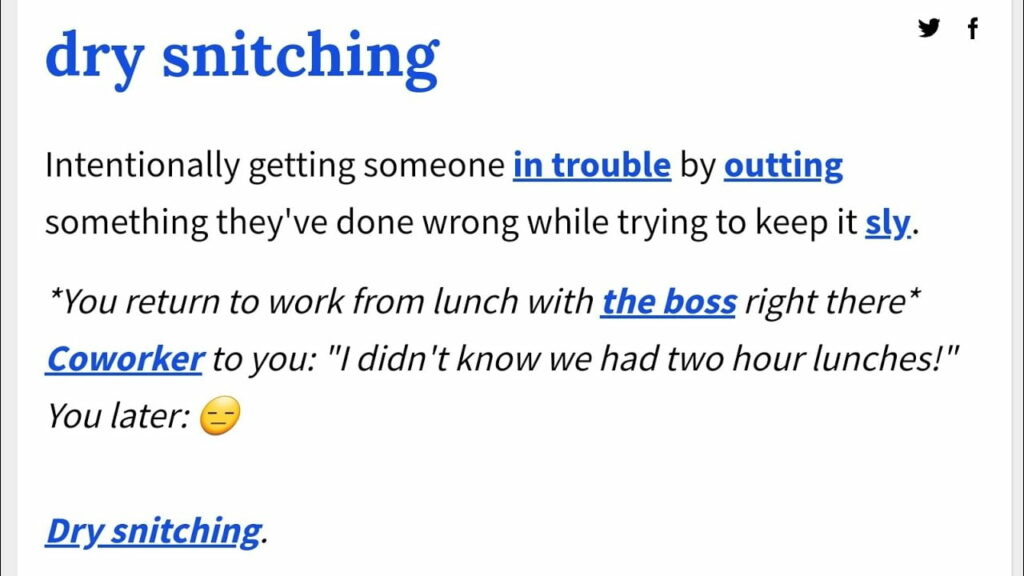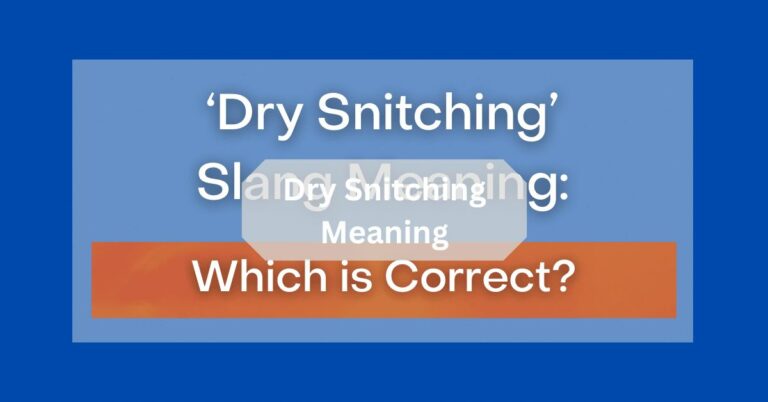Dry snitching, a term gaining prominence recently, represents a subtle yet impactful communication with potentially serious consequences.
Dry snitching means telling on someone without directly saying their name, usually by dropping hints or giving clues that could get them in trouble.
This article delves into the intricate nuances of dry snitching, exploring its origins, types, and significant impacts on individuals and communities.
Origins Of Dry Snitching:
The origins of dry snitching can be traced back to various contexts, including prison culture and street life.
In these environments, where trust is paramount and any form of betrayal can be dangerous, individuals develop subtle ways to communicate information without directly implicating others.
Types Of Dry Snitching:
1. Direct Dry Snitching:
This type involves explicitly revealing sensitive information without directly pointing fingers at specific individuals and, for example, mentioning details of a crime scene or illegal activity without naming those involved.
2. Indirect Dry Snitching:
Indirect dry snitching is more subtle and involves conveying information in a way that indirectly implicates someone without directly stating their involvement.
This could include using coded language, subtle hints, or body language to communicate sensitive information without explicitly naming names.
3. Gossiping:
Gossiping can also be a form of dry snitching, significantly when the information being shared could harm someone’s reputation or incriminate them.
Even if the gossip is not directly intended to damage, it can still have negative consequences if it reaches the wrong ears.
4. Social Media Posts:
Posting incriminating or sensitive information on social media platforms can also be a form of dry snitching.
Even if the post is not directly targeted at a specific individual, it can still indirectly implicate them if they are somehow associated with the content.
5. Anonymous Tips:
Providing anonymous tips to authorities or other individuals can be a form of dry snitching, especially if the information provided leads to investigations or legal action against someone else.
Even though the tipster remains anonymous, their actions can still have severe consequences for the implicated person.
Impact Of Dry Snitching:

1. Trust Erosion:
Dry snitching erodes trust between individuals and within communities. When sensitive information is disclosed indirectly, it can lead to feelings of betrayal and suspicion among those involved, damaging relationships and undermining social cohesion.
2. Strained Relationships:
Dry snitching can strain relationships between friends, family members, or colleagues. Even if the disclosure was unintentional or made in jest, revealing sensitive information can hurt feelings, resentment, and a communication breakdown.
3. Legal Consequences:
In some cases, dry snitching can have legal consequences, particularly if the disclosed information leads to criminal investigations or prosecutions.
Those implicated may face arrests, charges, and lengthy legal battles, regardless of their involvement in the wrongdoing.
4. Social Stigma:
Individuals indirectly implicated through dry snitching may face social stigma and ostracization within their communities.
Even if they are not directly accused or charged with wrongdoing, associating with incriminating information can tarnish their reputation and stand among their peers.
5. Fear And Paranoia:
Dry snitching can create an atmosphere of fear and paranoia within communities as individuals become wary of who they can trust and what information they can safely share. This can lead to increased tension, isolation, and a breakdown in social bonds.
6. Cultural Norms:
Dry snitching can reinforce harmful cultural norms and values, such as a lack of loyalty or integrity.
In environments where dry snitching is commonplace, individuals may see it as a necessary evil or a means of self-preservation, further perpetuating the cycle of mistrust and betrayal.
Dry Snitching In Different Contexts:
Dry snitching manifests in various contexts, from interactions within law enforcement agencies to everyday social dynamics.
In some cases, individuals may engage in dry snitching to gain favor with authorities or protect themselves from potential repercussions.
In other instances, it may be used as a form of social manipulation or coercion, exerting control over others subtly.
Read: Santiago Rulli Galliano – Discover Now!
Ethical Considerations Of Dry Snitching Meaning:

1. Betrayal Of Trust:
Dry snitching involves indirectly disclosing sensitive information that could harm or incriminate someone.
From an ethical standpoint, this can be seen as a betrayal of trust, especially in contexts where confidentiality and loyalty are valued.
2. Integrity And Honesty:
Ethical considerations of dry snitching also raise questions about integrity and honesty. Individuals may compromise their moral principles and integrity by engaging in behavior that indirectly implicates others, contributing to a culture of deceit and mistrust.
3. Consequences For Others:
One ethical dilemma of dry snitching is the potential harm it can cause to those indirectly implicated.
Even if the disclosure was not intended to cause harm, the consequences for the individuals involved could be significant, ranging from legal repercussions to social stigma and ostracization.
4. Fairness And Justice:
Dry snitching can also raise questions about fairness and justice, particularly if the disclosed information leads to unfair treatment or punishment of those implicated.
In some cases, individuals may be unfairly targeted or prejudged based on the information disclosed, leading to miscarriages of justice.
5. Personal Responsibility:
Ethical considerations of dry snitching also extend to personal responsibility. Individuals who engage in dry snitching must consider their actions’ potential consequences and their impact on others.
6. Cultural And Contextual Factors:
Ethical judgments of dry snitching may vary depending on cultural and contextual factors. What is considered acceptable or unacceptable behavior in one context may be viewed differently in another.
How To Avoid Dry Snitching:
1. Think Before You Speak:
Before sharing any information, consider whether it could harm or incriminate someone. If in doubt, it’s best to err on the side of caution and keep the information to yourself.
2. Respect Confidentiality:
Respect the confidentiality of sensitive information shared with you by others. Avoid disclosing this information to third parties unless you have explicit permission.
3. Use Discretion:
Be mindful of the context and the potential consequences of your words and actions. Avoid discussing sensitive topics or sharing incriminating information in public or online forums where it could be easily overheard or accessed by others.
4. Be Mindful Of Body Language:
Remember that nonverbal cues such as body language, facial expressions, and tone of voice can also convey sensitive information.
Be conscious of how you present yourself and avoid inadvertently implicating others through subtle gestures or cues.
5. Practice Empathy:
Put yourself in the shoes of the person you’re talking about and consider how they might feel if they were aware of what you’re saying. Treat others with empathy and respect, even if you disagree with their actions or decisions.
6. Communicate Directly:
If you have concerns or suspicions about someone’s behavior, address them directly and respectfully. Avoid gossip or indirect communication, leading to misunderstandings and hurt feelings.
7. Seek Permission:
Suppose you feel compelled to share sensitive information that could implicate someone else; seek their permission first.
Respect their right to privacy and autonomy, and only disclose the information with their consent.
8. Build Trust:
Cultivate relationships built on trust, honesty, and mutual respect. By fostering open and transparent communication with others, you can create an environment where people feel comfortable sharing information without fear of betrayal or judgment.
9. Educate Others:
Raise awareness about the potential consequences of dry snitching and the importance of respecting others’ privacy and confidentiality.
Encourage others to think critically about the information they share and the impact it may have on others.
Famous Cases Of Dry Snitching:
- The Salem Witch Trials: Accusations of witchcraft were often based on hearsay and gossip, leading to false accusations and indirect disclosure of sensitive information.
- McCarthyism: During the Red Scare, individuals were accused of being communist sympathizers based on vague evidence, leading to widespread paranoia and ruined reputations due to anonymous tips and indirect disclosures.
- The Watergate Scandal: White House aides indirectly disclosed sensitive information to journalists and investigators, unraveling a political cover-up and leading to President Nixon’s resignation.
- Whistleblower Cases: Whistleblowers have exposed wrongdoing within organizations and governments, indirectly disclosing confidential information that implicates others in misconduct.
- Celebrity Feuds: Celebrities engage in subtle forms of snitching through cryptic social media posts, leaked emails, or anonymous tips to the press, aiming to gain leverage or tarnish rivals’ reputations.
Read: New Child Support Law 2023 Texas
In A Nutshell:
Dry snitching is a complex phenomenon with significant implications for individuals, communities, and society.
Understanding the origins, types, and impacts of dry snitching is essential for addressing the root causes of this behavior and fostering healthier and more resilient social environments.
FAQ’s:
1. What Is The Difference Between Dry Snitching And Regular Snitching?
Dry snitching indirectly discloses sensitive information, whereas regular snitching involves directly implicating others.
2. Can Dry Snitching Lead To Legal Repercussions?
Yes, depending on the circumstances, dry snitching can potentially lead to legal consequences, particularly if the disclosed information is incriminating.
3. How Does Dry Snitching Affect Relationships?
Dry snitching can strain relationships and erode trust, especially in close-knit communities where loyalty is valued.
4. Is Dry Snitching Always Intentional?
Not necessarily. Sometimes, individuals may engage in dry snitching without fully realizing the potential consequences of their actions.
5. Are There Any Benefits To Dry Snitching?
While some may perceive benefits such as gaining favor with authorities, the long-term consequences of dry snitching often outweigh any short-term advantages.
Also Read:
